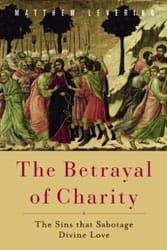 In The Betrayal of Charity, rising Catholic theologian Matthew Levering shows how the sins against love - hatred, sloth, envy, discord and contention, schism, war and strife and sedition and scandal - threaten love's concrete efforts by rebelling against dependence on God and undermining interdependence on others. Read an excerpt from the book below.
In The Betrayal of Charity, rising Catholic theologian Matthew Levering shows how the sins against love - hatred, sloth, envy, discord and contention, schism, war and strife and sedition and scandal - threaten love's concrete efforts by rebelling against dependence on God and undermining interdependence on others. Read an excerpt from the book below.
Visit the Patheos Book Club Roundtable to read responses from prominent scholars and bloggers about The Betrayal of Charity and join the conversation.
The Betrayal of Charity—Conclusion
Quoting Étienne Gilson's remark that "the most marvelous of all things a being can do is to be," Josef Pieper attempts to describe the basis of love: "For what the lover gazing upon his beloved says and means is not: How good that you are so (so clever, useful, capable, skillful), but: It's good that you are; how wonderful that you exist!"[i] God's creative act, pouring forth the goodness of finite being, is sheer love. God loves us into existence and rejoices in created goodness: "And God saw everything that he had made, and behold, it was very good" (Gen 1:31). When by God's gift we experience the joy of loving God in himself-his Trinitarian communion-our joy involves peace. Our rational appetite finds its fulfillment in loving the infinite goodness of God (and the participated goodness of our neighbors).[ii]
Faced with evils or defects in goodness, the charitable person's response is mercy. God has mercy upon us by bountifully healing our defects through his causal love, and in light of our defects we have mercy on each other by seeking to do good to each other. As regards outward acts, this manifests itself as beneficence-the bestowal of gifts-and the works of mercy, among which Aquinas numbers "to feed the hungry, to give drink to the thirsty, to clothe the naked, to harbor the harborless, to visit the sick, to ransom the captive, to bury the dead," as well as "to instruct the ignorant, to counsel the doubtful, to comfort the sorrowful, to reprove the sinner, to forgive injuries, to bear with those who trouble and annoy us, and to pray for all."[iii] The works of mercy also include fraternal correction, to which Aquinas gives special place because of its difficult but necessary role in sustaining the communion of the people of God.
In all these ways, we say to the beloved, whether God or our neighbor: "It's good that you are; how wonderful that you exist!" We say this not merely on the natural level, but in light of God's gift of a participation in his own Trinitarian life, eternal life with the Father, Son, and Holy Spirit. With the Father, Son, and Spirit we proclaim, "It's good that you are; how wonderful that you exist!" In this proclamation is the joy and peace of charity.[iv]
By contrast, the sins against charity bespeak the opposite of this joy and wonder in another's existence. Far from rejoicing in God or neighbor, hatred sees the existence of God or neighbor as opposed to our own good. The freshness of joy and wonder is lost in sloth, which sorrows rather than exults about God's gifting, with the result that the slothful person falls into despair, cowardice, sluggishness, spite, malice, and unlawful bodily pleasures. In its selfish joylessness, envy cries out, "How sad it is that you exist more perfectly than I do!" rather than "How wonderful that you exist!" Discord and contention, rooted in pride, set up one's own opinion over against the gift of communion with God and neighbor; joy and wonder are squelched by the desire to dominate others. Schism severs the visible unity of the people of God, the body of Christ to which we should rather respond, with ever greater praise, "How wonderful that you exist!" War, as unjust slaughter driven by the desire to dominate, distorts and destroys human life, and strife and sedition aggressively seek to harm human communion. Scandal actually seeks the eternal spiritual harm of others. How profoundly opposed these actions are to joy and wonder in another's being!




